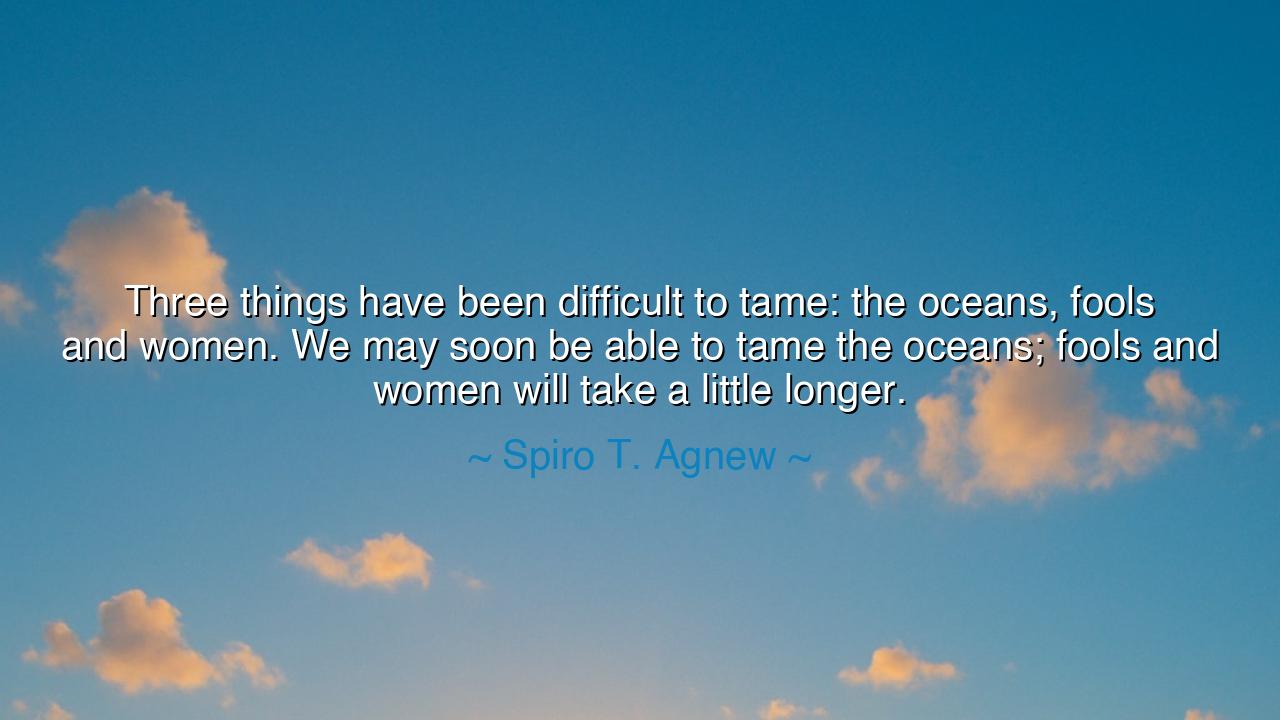
Three things have been difficult to tame: the oceans, fools and
Three things have been difficult to tame: the oceans, fools and women. We may soon be able to tame the oceans; fools and women will take a little longer.






The words of Spiro T. Agnew — “Three things have been difficult to tame: the oceans, fools, and women. We may soon be able to tame the oceans; fools and women will take a little longer.” — were spoken with the wit of jest, yet they reveal the prejudices and ironies of their age. Agnew, Vice President under Richard Nixon, sought humor, but his words echo the long history of men who feared or mocked what they could not control. In comparing women to the wildness of oceans and the folly of fools, he both diminishes and unwittingly elevates them, for what is untamed is often also unconquerable.
The meaning is layered. To call the oceans untamed is to acknowledge the vast, unstoppable force of nature. To call fools untamed is to lament the persistence of ignorance across the ages. But to place women in this company reveals both bias and truth: bias, in suggesting that their independence is something to be subdued; truth, in recognizing that their spirit, like the sea, has long resisted every attempt to chain it. Thus, while Agnew intended jest, his words serve as an accidental tribute to the indomitable power of women.
History proves this again and again. Consider the suffragists of the early twentieth century, who endured ridicule, prison, and violence in their fight for the vote. Many men of power declared it was impossible to give women equality, as if their voices could be drowned or delayed forever. And yet, like the rising tide of the oceans, their cause advanced relentlessly, sweeping away resistance until the ballot was won. Those who tried to tame them discovered only that their strength grew greater in struggle.
As for fools, history shows their persistence as well. Tyrants, demagogues, and flatterers have risen in every age, and though nations spend centuries seeking to banish folly, it returns like waves upon the shore. In this, Agnew’s words carry more truth than perhaps he intended: the battle against ignorance is as eternal as the struggle against storm and sea.
Let this wisdom be passed down: the attempt to tame what is wild in spirit often reveals more about the weakness of the tamer than the strength of the tamed. The oceans will never be fully subdued, fools will never be wholly banished, and women, whose power lies in resilience and renewal, will never bow to chains. Agnew’s jest, meant to diminish, becomes a prophecy of endurance: that what is truly great resists control, and that in their untamed nature, both women and the oceans shall outlast the men who sought to master them.






T839.Le Phuoc Thinh. 8/7
While Agnew’s quote may have been meant humorously or as a reflection of his political context, it raises important questions about how women were viewed in the past. What does it say about a culture where women were consistently compared to fools or forces needing to be 'tamed'? How do we ensure that such stereotypes don’t persist in the modern era, and how can we empower women to break free from these limiting narratives?
NMNguyen Ngoc Nhat Minh
The comparison of women to fools and the suggestion that they need to be tamed is an uncomfortable thought, but unfortunately, such attitudes were quite common in Agnew’s time. How much has changed since then, and are these views still pervasive in some parts of society today? Is it possible to undo centuries of patriarchal thought, and how do we foster a more inclusive mindset that sees women as equals, not something to be controlled?
HLvan hoe lo
Agnew’s quote offers a glimpse into a time when gender roles were rigidly defined, and women were often seen as the 'other' in need of control. Is this mindset something we still struggle with today? How far have we really come in terms of seeing women as equals? What can we do to ensure that language like this doesn’t continue to shape societal perceptions of women’s capabilities and roles?
NLnhung luu
Spiro Agnew’s words sound like a reflection of outdated gender norms, where women were often seen as unruly and needing control. While the reference to taming the oceans might be metaphorical, comparing women to fools in this context is concerning. How does such language influence societal views on women’s autonomy, and what responsibility do we have in ensuring that such outdated ideas don’t perpetuate in modern discussions about gender equality?
HMNguyen Thi Hong Minh
This quote is quite troubling, as it implies that women, like fools, are something to be tamed or controlled. What message does it send about the treatment of women in society? Is it reinforcing harmful stereotypes that have been used for centuries to justify inequality? How do we break down such perspectives, and is it even possible to change deeply ingrained views about gender roles?